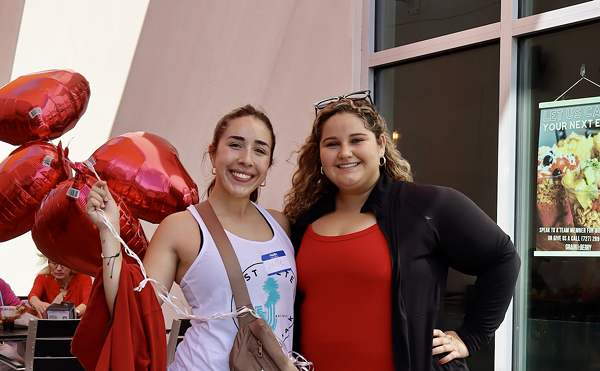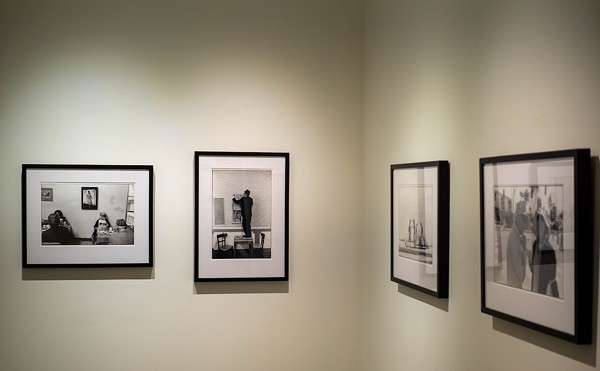
I’m a fool for Shakespeare. Reading it? Not so much (although I do credit my love for the Bard to the Shakespeare for kids-type book my fifth grade teacher gave me—shoutout, Marie Grein!) but when a theater company does it well? I could watch it all day and night.
Which is why I did not want Jobsite Theater’s production of “A Midsummer Night’s Dream” to end Sunday; a well-done Shakespeare play is like a fine wine (in that you always want more, not that it won’t give you a hangover, although that’s also true.) From the opening moments, the players entranced me, although none moreso that Katrina Stevenson, perhaps the best Puck ever. Nymphlike and mischievous, her Puck lends more breadth to the desirable role with her acrobatics and facial expressions.
“A Midsummer Night’s Dream”
Jobsite Theater at David A. Straz Center for the Performing Arts
1010 WC MacInnes Pl., Tampa. Through Feb. 16
$29.50 & up, demand-dependent.
813-229-STAR, jobsitetheater.org
But it wasn’t only Puck who entranced me into this dreamlike world; the fairies one and all made me long for a show with only them. Jobsite warns on its website not to arrive late, because missing the first few minutes would take away from the production, and reader, they’re not lying; the aerialists offer this classic dimension that marries physical art with the lyrical one, and if you miss the first few minutes you’re missing the framework for the entire show.
I wish, too, that I could have a day or two to linger over coffee and talk about the feminist themes. And perhaps I shall, but before I do that I need to write this review so you know why it’s imperative you see this wondrous interpretation of the Bard at Jobsite. Look, they’re not doing anything outrageous—no “Midsummer” set during a woman’s march on Washington (honestly, though, I’d see that, too) or “Midsummer” a la “Happy Days” (could be fun, and lord knows some of us would applaud a Hermia as a Joannie, eschewing Chachi for, say, Ralph Malph)—but this production demonstrates a deep love for and intrinsic understanding of Shakespeare’s deeper meanings and sense of comedy.
The feminist themes do deserve discussing, because at its core, this play is a play about men attempting to control women. I love, love, LOVE how annoying most of the men in the show are, and if Oberon (Adam Workman, who also plays Theseus) annoys with his penis-forward walk (ladies, we all know this guy, right?), it’s only because he’s a bit too real for a fantasy. But then, Shakespeare reminds us, it’s not a woman’s fantasy; we’re watching a man’s fantasy of control and subjugation. Sort of. It’s, uh, complicated. Which is why I say the feminist themes deserve discussing.
But you’ll have to talk about those yourselves, knowing only that this critic thinks Jobsite handled them well and did an admirable job bringing them gently and not-so-gently to the forefront, and that alone makes the show worth seeing.
Let me say, too, that for the most part, every woman cast here adds to the appeal: Sadie Lockhart’s Hermia and Kara Sotakoun’s Helena do a fine job with a throughline for the show, and Haley Janeda’s Titania and Hippolyta radiates every moment onstage. The fairies and the mechanicals—sans Giles Davies, and I’ll get to him in a moment—also deserve heaps of accolades: Adriana Corso, Nancy Mizzell, Kasondra Rose and yes, my god, yes, Martin E. Powers offered nothing but delight and amusement every moment onstage. Mr. Powers, I hope to see more of you, sir, and soon.
And Giles Davies. Poor Giles Davies, who suffered mightily in my mind when I saw his name in the program.
“I mean, he’s good,” I whispered to my husband before the show, “but I’m tired of seeing him.” (Jobsite loves it some Giles Davies.) Mr. Davies, I apologize for that, because it was pretty clear after about 24 seconds of you onstage that no one else could have done what you did, and I would not have loved this as much without you in it. You’re a master, sir, and I’m flattered you choose to let us watch you perform.
This gushing should not suggest the play is not without its missteps; in the second half, the male suitors—Lysander (Patrick Jackson) and Demetrius (Matt Acquard) decide to go loud AF and the women have, it seems, no choice but to match their obnoxious volume. It’s a small house, y’all; we can hear you just fine. Cornelio Aguilera, as Quince and Egeus, similarly, seemed inclined to bring volume when none was needed. Gentlemen, you got this. No need to go loud; you all did a fine job.
Whatever missteps I may mention here, whatever with which I may quarrel? It should not mean the show will not delight. It’s a dream worth dreaming.
Cathy Salustri is the former arts + entertainment editor for Creative Loafing Tampa Bay. Contact her at [email protected].
Follow @cl_tampabay on Twitter to get the most up-to-date news + views. Subscribe to our newsletter, too.
















